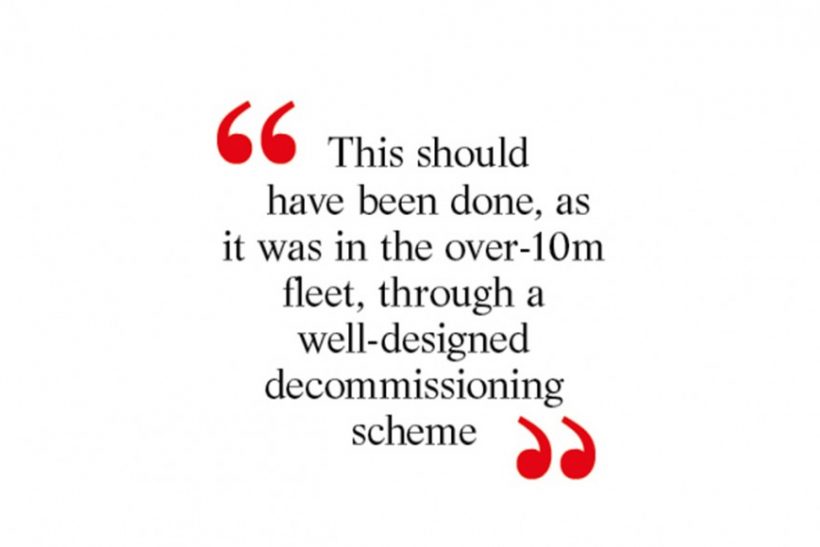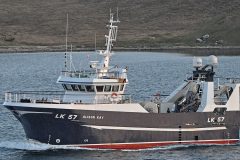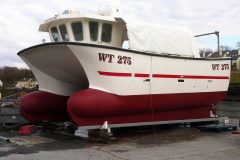DEFRA: Decisions to be notified ‘as soon as we can’
Well over half of the English under-10m vessel owners whose licences were capped or suspended have appealed against their capping notifications, reports Tim Oliver.
DEFRA says it has received 447 appeals out of 782 licences it capped (whitefish) or suspended (shellfish) in February this year. It is considering each appeal and will share the outcome with those appealing ‘as soon as we can’. The deadline for appeals has now passed.
DEFRA points out that the number of capping notifications issued may be smaller than the total number of capped or suspended licences, as some fishermen will hold both finfish and shellfish licences or entitlements.
Capping has been introduced to reduce latent capacity in the under-10m sector and the latest round is being imposed on vessels that caught less than 350kg of quota species in each year in the reference period 2010-2013 or did not catch any shellfish during that period.
DEFRA says the cap is temporary and could be removed or relaxed if stocks recover and more fishing opportunities become available.
NUTFA and the NFFO both criticised the licence capping scheme and said they had advised many under-10 vessel owners who had contacted them because they were worried about the scheme and potential financial losses to appeal.
NFFO chief executive Barrie Deas told Fishing News: “We absolutely agree that every fisherman who feels he has been disadvantaged by the capping exercise should appeal, and we have helped a number of our members who have approached us for help and advice with their appeals.”

NFFO chief executive Barrie Deas: ‘Every fisherman who feels he has been disadvantaged by the capping exercise should appeal.’
He said the NFFO’s view was that the capping exercise was not the right way to tackle the problem of overcapacity. He said that for those vessels that target non-TAC species, this approach would intensify the problems faced when the full landing obligation comes into effect. The right approach would have been a decommissioning scheme.
“Getting fishing capacity in line with fishing opportunities is the foundation for every successful management regime, and we do think that removing unused licences is the right place to start in the under-10m fleet.
“This should have been done, as it was in the over-10m fleet, through a well-designed decommissioning scheme.”
A DEFRA spokesperson told Fishing News: “To ensure the long-term stability of our under-10 fishing fleets, we have capped a number of largely inactive fishermen to bring certainty to the majority of those relying on fishing quota stocks to make a living.
“We consulted under-10 fishermen before making this change. The cap is set at 350kg, and will only affect fishermen who have consistently caught less than 300kg a year over four years, meaning these fishermen can continue to fish exactly as they have been doing.
“To help the smaller fishing inshore fleet we took unused quota from the over-10m vessels and permanently transferred this to the under-10s, giving them an extra 678t in 2015. This year, these vessels will also receive more than 1,000t of quota uplift to support smaller-scale fishermen as they adapt to the discard ban, which came into force on 1 January 2016.”
‘What is DEFRA trying to achieve?’
NUTFA co-chairman Dave Cuthbert said those who appealed should have ‘a reasonable chance of success’. He said NUTFA had recently met fisheries minister George Eustice and DEFRA officials who said they did not want to stop ‘genuine fishermen’.
“I wonder what they are trying to achieve with this licence capping exercise,” he told Fishing News.
“On one hand you’ve got people in the PO sector saying ‘if you give more quota to under-10s it will mean more fish being uncaught’.
“But on the other hand, DEFRA is saying ‘we’ve got to cap licences because we don’t want people fishing’! What are we talking about here? If fishermen didn’t catch demersal fish in the past three years, why does DEFRA suppose they will catch more than 350kg in the next three years?”
He said when there was an unrestricted fishery before Registration of Buyers and Sellers regulations (RBS) came into force there was a degree of latent capacity in the fleet. This was necessary to allow people to enter and leave the industry.
“If you don’t have that capacity the industry will stagnate and you are left with old men going nowhere,” said Dave Cuthbert.
“A lot of people come in and a lot go straight back out again – they say it’s too hard, they can’t make a living and so on, but you have to have that latent capacity to let people in.”
Dave Cuthbert also questioned the fact that licences are being suspended temporarily. “DEFRA says if you catch 350kg in the next 12 months you can go back to them and ask for the cap to be lifted. But how are you supposed to survive for a year on 350kg of fish? They say you’ll be able to catch bass as well now that the suspension has ended but bass catches are restricted as well – it’s another dog’s breakfast.”
He said the temporary suspension of licences would make a legal challenge difficult because DEFRA could argue that the licence had not been taken away.
Dave Cuthbert also slammed the consultation that was held before the decision was announced. He said DEFRA had sent a very junior official to the ports to explain the policy who had said he would report back the industry view, which was strongly against capping, but it went ahead anyway.
“Everyone says the same – what’s the point of a consultation when they just do what they want anyway? They say it’s a genuine consultation, but that’s only if you agree with them. If you don’t, they just ignore you.”


DEFRA: Decisions to be notified ‘as soon as we can’
Well over half of the English under-10m vessel owners whose licences were capped or suspended have appealed against their capping notifications, reports Tim Oliver.
DEFRA says it has received 447 appeals out of 782 licences it capped (whitefish) or suspended (shellfish) in February this year. It is considering each appeal and will share the outcome with those appealing ‘as soon as we can’. The deadline for appeals has now passed.
DEFRA points out that the number of capping notifications issued may be smaller than the total number of capped or suspended licences, as some fishermen will hold both finfish and shellfish licences or entitlements.
Capping has been introduced to reduce latent capacity in the under-10m sector and the latest round is being imposed on vessels that caught less than 350kg of quota species in each year in the reference period 2010-2013 or did not catch any shellfish during that period.
DEFRA says the cap is temporary and could be removed or relaxed if stocks recover and more fishing opportunities become available.
NUTFA and the NFFO both criticised the licence capping scheme and said they had advised many under-10 vessel owners who had contacted them because they were worried about the scheme and potential financial losses to appeal.
NFFO chief executive Barrie Deas told Fishing News: “We absolutely agree that every fisherman who feels he has been disadvantaged by the capping exercise should appeal, and we have helped a number of our members who have approached us for help and advice with their appeals.”

NFFO chief executive Barrie Deas: ‘Every fisherman who feels he has been disadvantaged by the capping exercise should appeal.’
He said the NFFO’s view was that the capping exercise was not the right way to tackle the problem of overcapacity. He said that for those vessels that target non-TAC species, this approach would intensify the problems faced when the full landing obligation comes into effect. The right approach would have been a decommissioning scheme.
“Getting fishing capacity in line with fishing opportunities is the foundation for every successful management regime, and we do think that removing unused licences is the right place to start in the under-10m fleet.
“This should have been done, as it was in the over-10m fleet, through a well-designed decommissioning scheme.”
A DEFRA spokesperson told Fishing News: “To ensure the long-term stability of our under-10 fishing fleets, we have capped a number of largely inactive fishermen to bring certainty to the majority of those relying on fishing quota stocks to make a living.
“We consulted under-10 fishermen before making this change. The cap is set at 350kg, and will only affect fishermen who have consistently caught less than 300kg a year over four years, meaning these fishermen can continue to fish exactly as they have been doing.
“To help the smaller fishing inshore fleet we took unused quota from the over-10m vessels and permanently transferred this to the under-10s, giving them an extra 678t in 2015. This year, these vessels will also receive more than 1,000t of quota uplift to support smaller-scale fishermen as they adapt to the discard ban, which came into force on 1 January 2016.”
‘What is DEFRA trying to achieve?’
NUTFA co-chairman Dave Cuthbert said those who appealed should have ‘a reasonable chance of success’. He said NUTFA had recently met fisheries minister George Eustice and DEFRA officials who said they did not want to stop ‘genuine fishermen’.
“I wonder what they are trying to achieve with this licence capping exercise,” he told Fishing News.
“On one hand you’ve got people in the PO sector saying ‘if you give more quota to under-10s it will mean more fish being uncaught’.
“But on the other hand, DEFRA is saying ‘we’ve got to cap licences because we don’t want people fishing’! What are we talking about here? If fishermen didn’t catch demersal fish in the past three years, why does DEFRA suppose they will catch more than 350kg in the next three years?”
He said when there was an unrestricted fishery before Registration of Buyers and Sellers regulations (RBS) came into force there was a degree of latent capacity in the fleet. This was necessary to allow people to enter and leave the industry.
“If you don’t have that capacity the industry will stagnate and you are left with old men going nowhere,” said Dave Cuthbert.
“A lot of people come in and a lot go straight back out again – they say it’s too hard, they can’t make a living and so on, but you have to have that latent capacity to let people in.”
Dave Cuthbert also questioned the fact that licences are being suspended temporarily. “DEFRA says if you catch 350kg in the next 12 months you can go back to them and ask for the cap to be lifted. But how are you supposed to survive for a year on 350kg of fish? They say you’ll be able to catch bass as well now that the suspension has ended but bass catches are restricted as well – it’s another dog’s breakfast.”
He said the temporary suspension of licences would make a legal challenge difficult because DEFRA could argue that the licence had not been taken away.
Dave Cuthbert also slammed the consultation that was held before the decision was announced. He said DEFRA had sent a very junior official to the ports to explain the policy who had said he would report back the industry view, which was strongly against capping, but it went ahead anyway.
“Everyone says the same – what’s the point of a consultation when they just do what they want anyway? They say it’s a genuine consultation, but that’s only if you agree with them. If you don’t, they just ignore you.”




